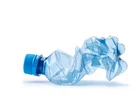Humans bottling it on water sustainability

What used to be a bit of a status symbol or a silly refection of your health credentials has become the scourge of our times. Drinking bottled water is a bit like smoking these days. Bad for you, bad for everyone. Is there anything more depressing than the sight of a scrunched up bottle on the ground?
Yes, we once stupidly believed it was a sign of purity but, in reality, bottled water has an environmental impact 3,500 times greater than tap water according to a new paper, which carried out a lifecycle analysis of bottled water to reveal the true extent of its catastrophic environmental impact.
These findings come as consumption of bottled water globally is actually on the rise! But people do tend to buy water packaged in single-use plastic not just for convenience’s sake but because historically in many countries tap water has been linked to poor water quality and health risks.
In the first study of its kind, the researchers on the new 'Science of the Total Environment' paper wanted to weigh up these perceived health risks alongside the environmental impacts of both bottled and tap water. Barcelona became their area of focus due to a longstanding habit of bottled water consumption in the area. Indeed, bottled water is the primary water source for 60% of the population.
The thirst for packaged water is probably driven by historically high levels of carcinogenic compounds called trihalomethanes (THM) in parts of the city’s piped water supply. Such compounds are a by-product of the water disinfection process, and some studies suggest they might be linked to increased risks of bladder cancer. Improvements to Barcelona’s water treatment process, however, have resulted in the significant decline of THM concentrations since 2009, the study notes.
The research considered several possible scenarios. Firstly, the health and environmental consequences if everyone in Barcelona consumed only tap water, secondly if all the city’s residents drank tap water that had first been cleaned using a domestic filtering device and, thirdly, if everyone in the city drank only bottled mineral water.
A lifecycle analysis into the production of both tap and bottled water revealed their environmental costs under each scenario. In the case of bottled water, the analysis included the lifecycle stages of producing plastics, disinfecting and washing bottles before use, and the energy costs of filling them. The researchers then quantified the combined environmental impacts of these production processes, in terms of ecosystem damage, the quantity of natural resources used and the global human health impacts.
They found that if Barcelonans drank only bottled water, it would significantly outpace tap water in terms of environmental harms. The lifecycle analysis revealed the ecosystem impact to be 1,400 times higher than that of tap water, causing an estimated loss of 1.43 species a year. Furthermore, if everyone drank only bottled water, the costs of extracting raw materials would amount to almost $84 billion annually — 3,500 times higher than the extraction costs for water that comes out of a tap. This is likely due to the much higher costs of input materials, such as packaging, for bottled water.
Ultimately, the most sustainable way to keep people in the city hydrated would be for everyone to drink water from taps, the researchers determined. Though, they also explored the potentially greater health risks that may come with this switch.
Compared to bottled water, exposure to that carcinogenic compound THM, was higher in tapped sources, the study found. But the risk was relatively low: using a common measure of years that would be lost to ill-health or early death, the researchers determined that if everyone in Barcelona drank only tap water, the potential health impacts of THMs that remain in the city’s water would be equivalent to about 309 years lost, spread across the city’s entire population. That’s the same as two hours lost per person! This would also decline significantly to just 36 years spread across the whole populace, if everyone shifted to drinking tap water that had been domestically filtered, instead — which would effectively eradicate the risk.
Furthermore, these health risks have to be taken within a broader global context. Supplying Barcelona with 100% bottled water would drive a suite of environmental threats — resource destruction, chemical pollution, and greenhouse gas emissions — that would have their own health impacts. These, the researchers estimate, would cause an equivalent of 625 lost life years across the globe, annually. And that’s to supply the bottled water needs of just one city, meanwhile the thirst for single-use plastic-bottled water is increasing across the planet.
Furthermore, the plastic that houses bottled water is itself a cause for health concerns, with uncertainties about the hormone-disrupting effects of some plastic ingredients, and the still-unknown effects of microplastics that constantly shed from waste into the water that humans drink.
In conclusion, the study argues that on balance the sustainability gains of drinking tap water “far exceeds the human health gain from consuming bottled water in Barcelona.” One future goal is to understand why people keep purchasing plastic despite growing awareness of its harms, the researchers say — as suggested in Barcelona by the counter-intuitive surge in bottled water consumption, even as tap water quality has increased.
Clearly, just like smoking, the idea of stubbing out bottled water is going to require a cultural shift and a complete change of mindset. But, unlike smoking, the solution is much simpler. We will always need water and, within most homes in the developed world, the answer comes with the turning of a tap. Change is already there – reach out and we can touch it. Quite literally.



